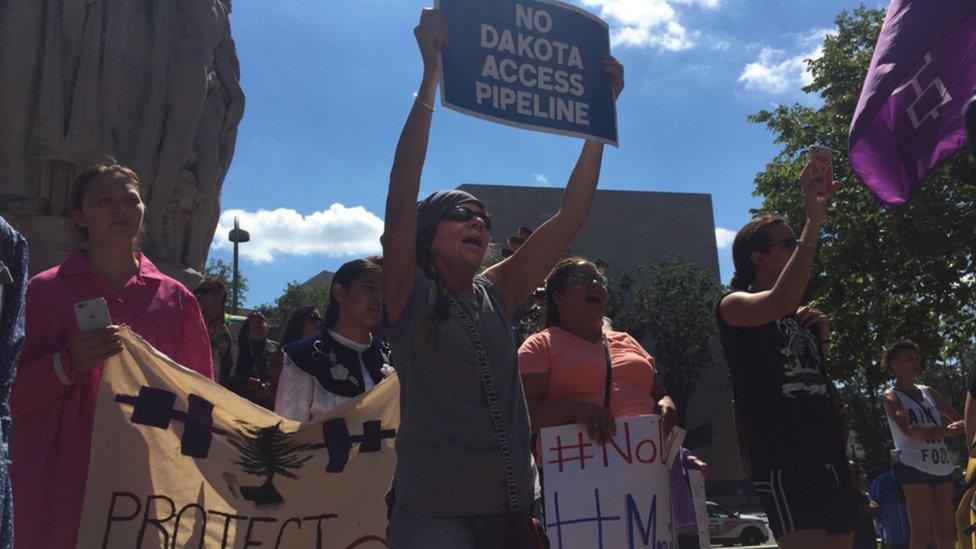What is Standing Rock and why are 1.4m 'checking in' there?
- Published
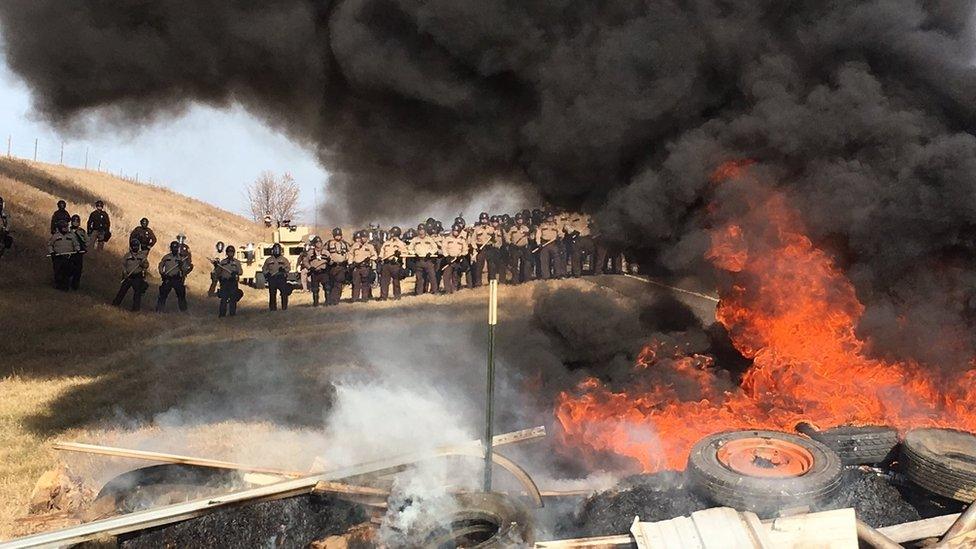
Activists have camped out in Standing Rock for months in protest against the pipeline
More than 1.4 million people have "checked in" on Facebook to support protesters fighting against a new oil pipeline in Standing Rock, a Sioux Native American reservation in North Dakota.
Activists say the Sioux Indians are under threat as the pipeline could contaminate the tribe's water source.
Protesters are worried police might be tracking them on social media, igniting concerns over digital privacy.
Why are so many people checking in on Facebook?
Their aim is to confuse the police.
They believe the local police department is using Facebook's location feature to compile a list of activists who are protesting about the pipeline.
The location feature allows users to tag themselves at a specific location or "check-in" and add related photos and videos.
Over the weekend, activists asked people to falsely "check in" on Facebook to confuse police about the number and identity of those actually protesting.
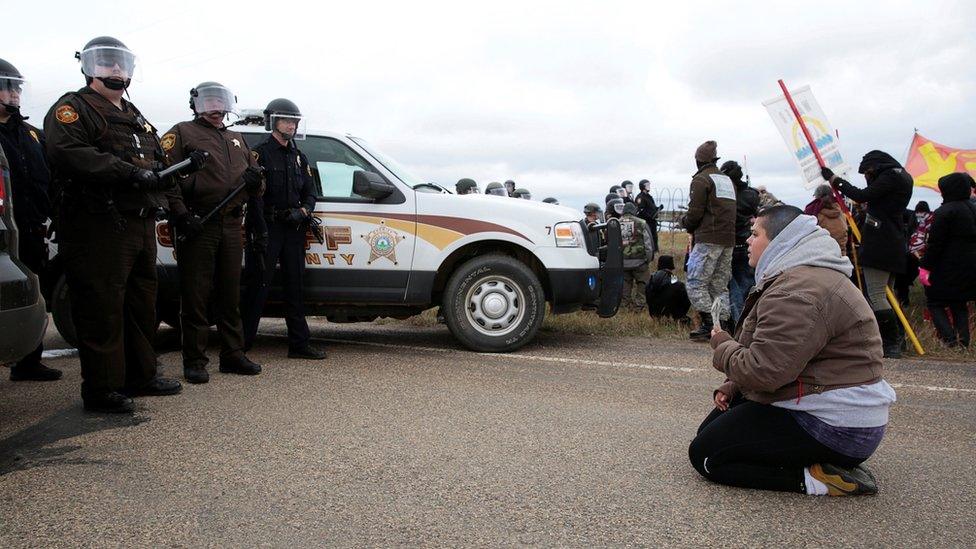
Critics have accused the police of using unnecessary force against protesters
Supporters put out a call for help on Facebook.
"The Morton County Sheriff's Department has been using Facebook check-ins to find out who is at SR [Standing Rock] in order to target them in attempts to disrupt the prayer camps," said the earliest publicly traceable version of the post, shared by a Facebook user from North Carolina on Sunday.
"SO Water Protectors are calling on EVERYONE to check-in at SR to overwhelm and confuse them."
What do the sheriffs say?
They deny they are using social media to track protesters' movements.
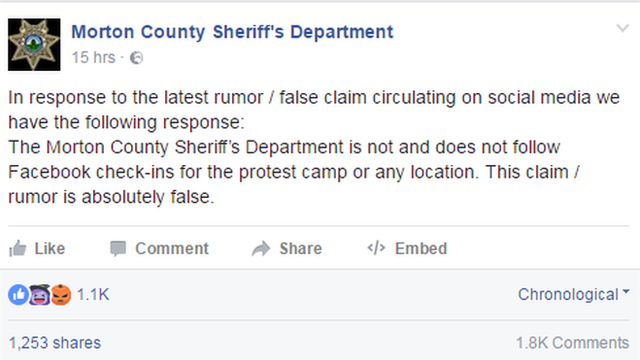
Snopes, a website that investigates internet rumours, said they had contacted police who denied using social media to track protesters.
"An officer explained that the metric [Facebook data] presented no intelligence value," one article on the website said, external.
"If police were using geolocation tools based on mobile devices, remote check-ins would not confuse or overwhelm them," it added.
Snopes did not confirm who started the viral Facebook post initially.
Are there issues with the police possibly using Facebook to monitor protesters?
Earlier this month, the American Civil Liberties Union (ACLU) reported, external that police had been using social media to track protesters during the Ferguson and Baltimore riots last year.
They said police had sourced information from Geofeedia, a data-providing company based in Chicago. The ACLU said this type of monitoring can "disproportionately impact communities of colour".
They also called upon social media executives to restrict access to data mining companies who would provide information to the police.
Facebook, Instagram and Twitter have since shut off access to Geofeedia.
What are people protesting about?
The $3.7bn (£2.8bn) Dakota Access pipeline has drawn huge protests in North Dakota where thousands of people are trying to halt its construction, most notably the Sioux Native Americans.
The tribe says the pipeline will traverse over their sacred ancestral burial grounds, archaeological sites, and could pollute their main source of water.
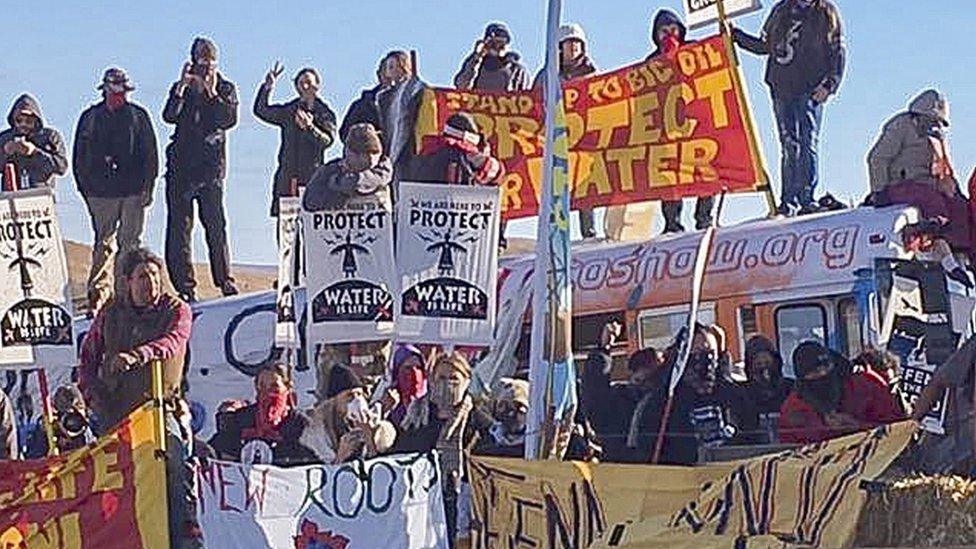
Protesters say the pipeline could pollute the tribe's main water source
Environmental activists have shown solidarity with the Sioux tribe saying the pipeline, which can transport up to 570,000 barrels of crude oil a day, will greatly increase fossil fuel emissions.
The company behind the pipeline, Energy Transport Partners, has said the project will boost local economies and is much safer than transporting oil by rail or road.
Have the protesters been treated fairly?
Critics say the police have used unnecessary force on activists. The local police have arrested nearly 150 activists.
They have contrasted the police treatment of North Dakota protesters to the recent acquittal of seven members of an armed militia who led a 41-day standoff at a wildlife refuge in Oregon over federal land ownership.
Some Native American activists have criticised the acquittal saying the Oregon protesters were given special privilege because they were white.
Actress Shailene Woodley was one of the protesters arrested
Native Americans in Standing Rock say they are committed to being unarmed.
Xhopakelxhit, a Native American activist at Standing Rock, told the Guardian, external: "If native people were armed like the Bundy militia, we would be killed."
A private security firms hired used by the pipeline company has used attack dogs on activists. Police say the firm was unlicensed and may face charges.
How have Native Americans been treated in the past?
Historically, the treatment of Native Americans has been brutal.
Spanish, British, and French colonisers all fought vicious wars with native tribes. And as the American nation state moved west, settlers and landowners fought bitter battles with tribes across the continent.
During the formation of states across America, the federal government made land deals with individual tribes. The reservation lands were agreed to under treaties and tribes were given autonomy to govern themselves on these lands.
The Sioux Indians have claimed the land they are protesting on is rightfully theirs under a 1851 treaty which was subsequently dishonoured. The police say they are on private land.
In September the federal government temporarily blocked, external pipeline construction under the Missouri River, close to the Standing Rock Reservation. Although this ruling is binding until further notice, construction elsewhere along the pipeline's route is not prohibited and has continued.
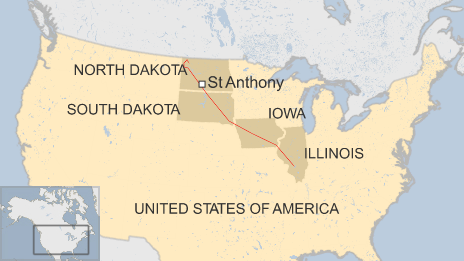
- Published28 October 2016
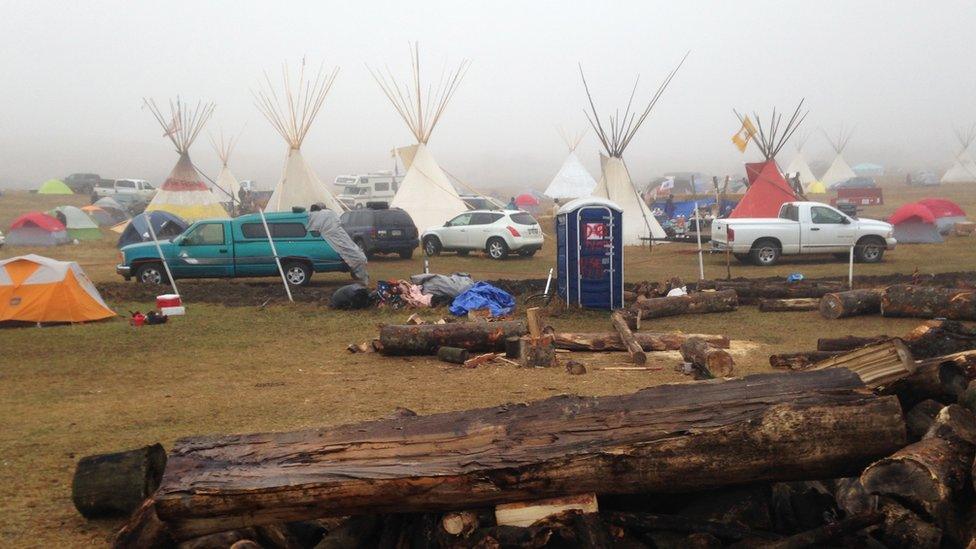
- Published17 October 2016

- Published24 August 2016
